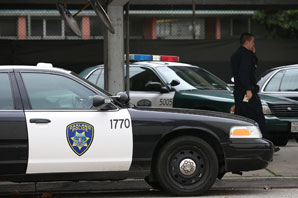(Key: Green markers: 2012 homicides “cleared” by police. Red markers: unsolved killings. Yellow markers: justified homicides. Blue marker: Officer-involved shooting, ruled justified. Click on markers for details of each case. Link: Oakland Homicides 2012: Cleared Cases)
Why is Oakland’s rate so low?
Oakland Police Capt. Johnny Davis says years of budget cuts have hurt the department’s ability to solve crimes. He says investigators are swamped, juggling an average of 20 cases a year. “There’s been studies that suggest an investigator should have no more than 5 cases in a year,” Davis says.
The department’s forensics lab is also overwhelmed, with a reported backlog of thousands of forensic testing requests, including many from homicide cases. But Davis says the Number One factor stopping investigators from solving homicides … is a lack of cooperation from witnesses in the community.
“The biggest challenge that we have is a lot of people who know what actually happened out there, and know these individuals because they’re in their communities, are failing to come forward or are afraid to come forward for some reason,” Davis says.
Jakada Imani of Oakland’s Ella Baker Center for Human Rights says that reason shouldn’t be a mystery. Many people in the community distrust the police, he says, because they’ve had bad experiences with officers.
“You can’t come into a home and pull out guns on grandmoms, and then expect people to help you,” Imani says. “You can’t show up on the scene of a traumatic incident and treat the young people who were witnesses and victims as if they are perpetrators.”
UC-Berkeley Criminal Justice scholar Barry Krisberg says police will continue to face major challenges solving crimes until they build a better relationship with residents, investigators will face major challenges.
“Most violent crimes are solved when citizens come forward and tell the police what they know,” Krisberg says. “And that’s why the relationship between the police and the community is so critical. The community has to trust the police; they have to feel like they and the police are on the same side.”
Krisberg also says Oakland’s low homicide clearance rate erodes confidence the police can do their jobs.”People expect that when serious crimes occur, that the police are gonna find the bad guys, and take ’em in custody,” he says.
Jakada Imani says that when that doesn’t happen, residents fear the consequences if they come forward.
“If the legal system is uncertain, but I believe that street justice is certain, then we have a problem,” he says.
* * *
Statistical note: The Oakland Police Department reported five justified homicides in 2012, a determination made jointly by police and the Alameda County district attorney’s office. Those cases included one officer-involved shooting and four cases that involved self-defense or citizens who interceded to stop a crime in progress.
Oakland’s 2012 homicide cases: Were arrests made?

